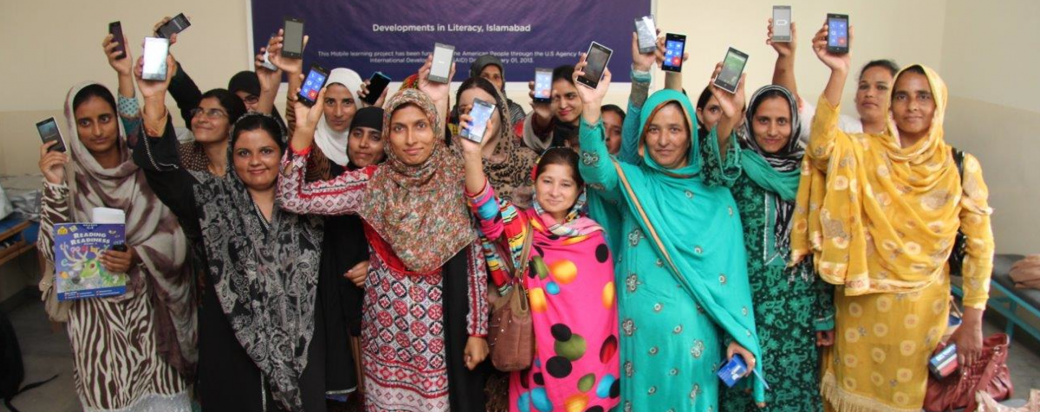
This initiative is part of the 2014-15 WISE Accelerator Cohort.
What they do
This project provides 200 primary and middle school math and English teachers with access to 300 lessons via mobile phone and is designed to clarify concepts that are important in delivering quality education. Videos are viewed offline by participants anytime and from any location. The project addresses the problem of content knowledge gaps among primary teachers, particularly in rural areas of Pakistan.
The competitive advantage of Developments in Literacy (DIL), the organization that runs the project, is that the content is homegrown, locally relevant and owned by DIL, which makes this simple, effective intervention highly scalable and cost-effective.
The boundless capacity of mobile devices for storing and accessing content make this an innovative and cost-effective alternative to in-person training or library development, particularly in rural settings where independent travel for female teachers runs counter to cultural norms. Mobile learning circumvents these issues by empowering teachers to assume ownership of the tools and learning process.
Why it matters
In the 17 years that DIL has been operating in Pakistan, it has been noticed that critical gaps in subject knowledge among rural teachers are a major obstacle to quality education. While teachers are motivated, they lack access to information to build knowledge.
Rural teachers in Pakistan are products of a deficient national education system hamstrung by poor quality and ineffective teaching. As a result, they have various gaps in basic knowledge that cannot be fully addressed in pre-service and in-service training. Teachers in rural areas are also less qualified academically and are less likely to receive training. In order to break this cycle of ineffective teaching, perpetuated in part by weak subject knowledge, teachers need access to on-going professional development opportunities that address such knowledge gaps through lessons designed to clarify concepts (UNESCO 2011 World Data on Education. 7th Edition).
Moreover, 57 percent of teachers in Pakistan live in rural areas and lack access to knowledge materials that support independent training.
Tractions so far
DIL equipped rural teachers with a digital library of locally relevant lessons accessible by mobile smartphone to clarify concepts and deepen understanding of the content they teach. The mobile learning project is based on the idea that teachers with stronger command of subject matter with deeper understanding will be better equipped to teach concepts effectively to their students.
The pilot developed 23 Internet hubs across three provinces, where teachers upload new lessons and receive technical support. DIL curated and designed localized content, and provided a digital library of 331 math and English lessons aligned with Pakistan National Standards.
Project effectiveness was measured by knowledge gained by users and impact on student learning. End of project target was 30 percent increase in content knowledge in both maths and English.
Mid-project assessment within the first phase, involving 200 teachers, resulted in a performance increase of 37 percent in math and 19 percent in English, compared to baseline. Baseline and mid-project assessments were conducted in monitored settings with standardized testing tools and protocols across project areas.
Six months later, at end of project, participating teachers demonstrated a performance increase of 47% compared to baseline in both maths and English content. Moreover, 93% of users expressed that Mobile Taleem had positively impacted their teaching. Principals observed increased student engagement and school pride as a result of teacher participation in DIL’s Mobile Taleem.
Mobile Taleem has developed a scaling strategy to raise quality education in Pakistan by engaging 100,000 teachers (equivalent of 41% of primary teachers in rural Pakistan) and impacting 2.5 million children.
To achieve this result, Mobile Taleem elaborated three approaches. First, Mobile Taleem plans to involve the teaching communities to enable the current users support new ones, attracting mobile providers and other partners. Second, Mobile Taleem aims at developing social franchising partnerships in order to train teachers from low NGO and government schools. Third, Mobile Taleem prepares to settle strategic mobile carrier partnership.
In terms of content development, Mobile Taleem will also write and produce additional video lessons and assessments to build a video library, and activate a platform for contributors to make open source lessons available. Furthermore, DIL is working on delivering more learning material in Pashto and Sindhi to complement those available in Urdu.